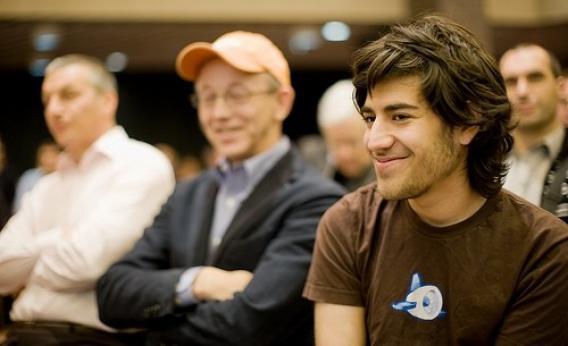I didn’t know Aaron Swartz, whose death by suicide was reported yesterday, all that well. We’d met a handful of times at Netroots Nation conferences or when I was up in Cambridge. But in the Internet era that hardly seems to matter. I followed him on Twitter. I read his blog and his amazing year-end book review wrap-ups. We exchanged some emails. Lots of people knew him better, but he felt like part of my life.
An extraordinary part! At first I had no idea who he was, and just thought he was one of several really smart political activists out there with what seemed like a slightly unusual intellectual depth. Then I learned about his whole secondary life as a purveyor of extreme techical skill. His role in creating RSS, Markdown, and Reddit. His work with Creative Commons. The (in)famous PACER stunt. The many acts of semi-random generosity in which he’d see a person he admired with a problem and whip up the solution on what seemed like the spur of the moment. I realized that this had to be the smartest, most talented person I’d ever met.
A few days ago I read what I didn’t know at the time would be his last twitter exchange:
Platinum aside, the thing that strikes me about this in retrospect is that I totally believed he had a Top Five U.S. Mint Directors and that while his selections wouldn’t necessarily be the ones I would pick if I bothered to research it (which, obviously, I hadn’t) but that there might well be compelling research behind it. I’m not sure I can think of anyone else who I’d have thought that about.
Hanging over his death is, of course, his persecution at the hands of U.S. Attorney for Massachusetts Carmen Ortiz. People commit suicide because they suffer from depression, which he did, not because they’re being railroaded by the U.S. Attorney, which he was. His crime was breaking into a random closet at MIT and mass downloading academic journal articles from JSTOR. Obviously if you get caught trespassing, you’re going to face some legal consequences. But not a federal case with talk of million dollar penalties and decades-long jail sentences.
Should people illegally duplicate academic research? I’ll just say that the other day a friend mentioned to me an academic article that he was interested in and I thought the title and abstract were interesting too. But none of us could read it. So I went on Twitter and asked if any of the academics among my followers would send me a copy. Within an hour I had a couple dozen instances of the article in question, forwarded a copy to my friend, and we both read it. That to me seemed wonderful. The public directly and indirectly subsidizes an awful lot of academic research on the theory that knowledge is an important public good. So the public should have access to it! We should be able to arrange the institutions such that this vast storehouse of human knowledge is open to the world without people breaking into closets at MIT or having a large social media presence they can take advantage of.
